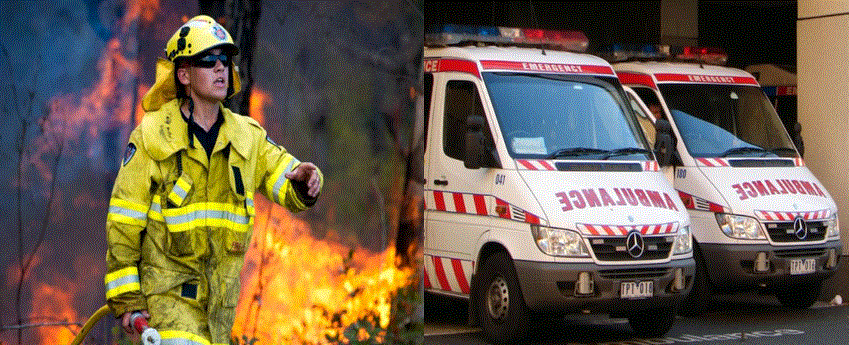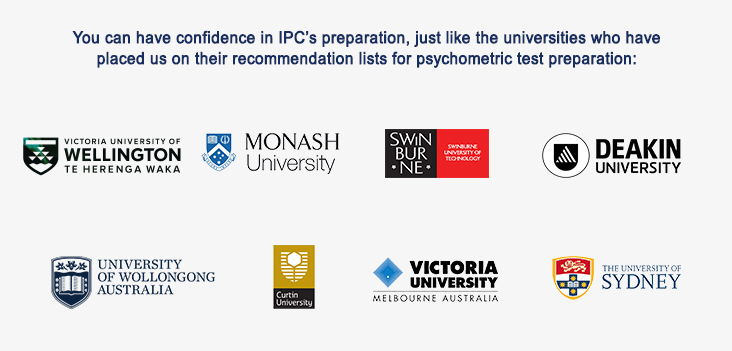Psychometric & aptitude testing for Graduates in Emergency Services
 Psychometric testing companies offer a wide range of psychometric tests (aptitude tests, personality tests and skill tests) with different difficulty and complexity levels. The combination of psychometric tests you will take and their level of difficulty are typically matched to that of a police, fire brigade and ambulance services graduate.
Psychometric testing companies offer a wide range of psychometric tests (aptitude tests, personality tests and skill tests) with different difficulty and complexity levels. The combination of psychometric tests you will take and their level of difficulty are typically matched to that of a police, fire brigade and ambulance services graduate.
In this section, we would like to offer you an introduction to the psychometric tests that someone who applies for a police and fire brigade graduate role is likely to get. You will learn about the type of psychometric tests you are likely to get and what employers expect to find in your psychometric test results. You can learn more about psychometric tests in our free psychometric test guide. To prepare for the psychometric test, take our short online psychometric test courses and practice psychometric tests online.
The types of psychometric tests we describe here are the typical tests offered for your role, but some companies/employers may deviate from this.
Based on our extensive experience, candidates applying for roles similar to that for which you applied are asked to complete the following psychometric tests:
Personality test
There are several popular work-related personality tests. In contrast to clinical personality tests that are widely available on the Internet and measure broad personality traits, these tests measure behavioural styles, attitudes and personality characteristics that were found to be relevant and impact people’s performance in a workplace.
The personality test typically measures your attitude towards and ability to work with stakeholders, your project/task management style, your behaviour style towards other people such as co-workers and managers, your ability to cope with stress in the workplace, your decision-making style, your level of creative thinking/acceptance of change, and more. Read more about the personality test in our free personality test guide
What do employers expect to find in the personality test results of a police, fire brigade and ambulance services graduate?
Employers will assess the extent to which your personality characteristics match those of the role you applied for. We list below the typical personality characteristics that employers seek in police, fire brigade and ambulance services graduates. As mentioned above, some employers may deviate from this list.
-
Taking personal responsibility and accountability
-
Emotional resilience
-
Desire for achievement
-
Working collaboratively with others but can also work on independent tasks
-
Consideration and sensitivity to others’ needs
-
Desire to support and assist others
-
Compliance with rules and regulations
-
Analysing situations in a structured, logical and calculated manner
-
Attention to detail
-
Taking charge (direct and guide others’ actions)
-
Accepting others’ input even if it is different from yours
-
Stress tolerance
-
Self-confidence
-
Self-awareness (knows his/her strengths and weaknesses)
Personality question example
Let’s look at the following example, which assists employers to learn about your drive for excellence and self motivation:
To which extent do you agree with the following statement on a scale of one to five?
‘I approach life in an easy-going manner’
1 – Strongly disagree
2 – Disagree
3 – Neutral
4 – Agree
5 – Strongly agree
Answering ‘Strongly disagree’ or ‘Agree’ implies that you have a strong inner drive to achieve, are challenged by difficult work-related targets, and are likely to work hard to reach your targets. Answering ‘Strongly disagree’ or ‘Agree’ implies that you prefer simple tasks and you derive satisfaction from a more relaxed and less ambitious workplace. Answering ‘Neutral’ implies that you are either indecisive or trying to hide your personality.
Take our practice personality test online and get a detailed report about your strengths and weaknesses relevant to the role you applied for. You will also get tips on how to better demonstrate your suitability in the personality test. To get better results, you should also take our short online personality test course. The course will guide you through the necessary steps you need to take to prepare for your personality test.
Read more about the personality test in our free personality test guide
Take our personality test course online
Take our practice personality test online
Numerical reasoning test
The numerical reasoning test is designed to measure not so much your mathematical ability but more your ability to quickly and accurately analyse numerical data, interpret graphic data, identify critical issues, and logically draw conclusions from numerical data.
The level of difficulty of the numerical reasoning test differs according to the relevant activities and responsibilities that the role requires. The test is timed and designed so only 1% to 2% of test-takers can correctly answer all questions within the time limit. The following are the types of numerical reasoning questions that you are likely to encounter in the test:
-
Graphs and tables interpretation
-
Percentage problems
-
Financial reports interpretation
-
Ratio problems
-
Currency conversion problems
Read more about the numerical reasoning test in our free numerical reasoning test guide
What do employers expect to find in the numerical reasoning test results of a candidate applying for a graduate role in the police, fire brigade and ambulance services?
The police and fire brigade are likely to place a moderate emphasis on your numerical reasoning skills, as they are less crucial in ensuring a high performance in this role. Therefore, they will expect you to have moderate numerical reasoning skills. This means that you will typically be assigned numerical reasoning questions that are of medium level of difficulty and complexity.
As an applicant for a graduate role in the police, fire brigade and ambulance services, you will be expected to demonstrate a moderate ability to quickly and effectively identify critical work-related issues and logically draw conclusions from numerical data such as performance figures, status and analysis reports. You will also be expected to show a moderate capacity to monitor performance and progress using numerical metrics and numerical performance indicators.
You can practise numerical reasoning test questions matching your role’s level of difficulty in our online practice numerical tests. You will be given a personalised and detailed report with your test results, correct test answers, answer explanations, and feedback on your relevant strengths and weaknesses. To get better results, you should also take our short online numerical reasoning course. The course will guide you through the necessary steps you need to take to prepare for the numerical reasoning test.
Read more about the numerical reasoning test in our free numerical reasoning test guide
Take our numerical reasoning test course online
Take our practice numerical reasoning tests online
Verbal reasoning test
The verbal reasoning test is designed to measure your oral and written verbal skills. It measures your ability to quickly understand and efficiently convey work-related concepts and information, quickly sieve through extensive amounts of work-related written data to identify critical issues, and logically draw conclusions.
As with the numerical reasoning test, the level of difficulty of the verbal reasoning test differs according to the relevant activities and responsibilities that the role requires. The test is timed and designed so only 1% to 2% of test-takers can correctly answer all questions within the time limit.
In the verbal reasoning test, you are given short passages of written information followed by a number of statements, and the task is to decide whether each statement is:
-
True: follows logically from the information provided
-
False: does not follow logically
-
Cannot tell: because there is insufficient information.
Topics contain material from the social sciences, physical or biological sciences, and business-related areas (marketing, economics, human resource management, etc.). Read more about the verbal reasoning test in our free verbal reasoning test guide
What do employers expect to find in the verbal reasoning test results of a graduate applying for the police, fire brigade and ambulance services?
You have applied for a graduate role in the police, fire brigade and ambulance services. This means that you will typically be given verbal reasoning questions that are of high level of difficulty and complexity. Employers are likely to expect you to have strong oral and written communication capabilities, as they are crucial to perform in the role.
You will be expected to demonstrate a strong capacity to quickly and effectively identify critical issues and logically draw conclusions from your conversations with others and written material such as instructions, policies and internal reports. You will also be expected to exhibit a strong capacity to explain work-related issues in a clear and simple manner to your work colleagues and others.
You can practise verbal reasoning test questions matching your role’s level of difficulty in our online practice verbal reasoning tests. You will be given a personalised and detailed report with your test results, correct test answers, answer explanations, and feedback on your relevant strengths and weaknesses. To get better results, you should also take our short online verbal reasoning course. The course will guide you through the necessary steps you need to take to prepare for the verbal reasoning test.
Read more about the numerical reasoning test in our free verbal reasoning test guide
Take our verbal reasoning test course online
Take our practice verbal reasoning tests online
Abstract reasoning test
The abstract reasoning test is designed to measure your conceptual reasoning skills. Conceptual reasoning is also referred to as lateral thinking or fluid intelligence. It measures your ability to quickly learn new information, identify patterns in data, integrate complex information, and apply it to solve work-related problems.
As with other aptitude tests, the level of difficulty of the abstract reasoning test differs according to the relevant activities and responsibilities that the role requires. The test is timed and designed so only 1% to 2% of test-takers can correctly answer all questions within the time limit.
In the abstract reasoning test, you are given several series of shapes. Each series has one or several logical rules that define a pattern among all shapes. The tasks in an abstract reasoning test question can be:
1. Decide which is the next shape in the series.
2. Identify the shape that should replace the missing one.
The abstract reasoning questions typically include different and unfamiliar shapes to maintain some element of surprise and to make the task challenging.
Read more about the abstract reasoning test in our free abstract reasoning test guide
What do employers expect to find in the abstract reasoning test results of a graduate applying for the police, fire brigade and ambulance services?
Abstract reasoning or lateral thinking skills are essential to achieve successful performance in the role of a graduate in the police and fire brigade. Therefore, the police, fire brigade and ambulance services are likely to expect you to demonstrate strong abstract reasoning skills. This means that you will typically be given a series of shapes based on logical rules that are of high difficulty and complexity levels.
As an applicant for a graduate role in the police, fire brigade and ambulance services, you will be expected to demonstrate a strong capacity to quickly gather a variety of new work-related information to assist you in making informed decisions. You will also be expected to show a strong capacity to quickly learn new skills, integrate new information or assess problems that are outside the scope of your usual knowledge and experience. You will also be expected to demonstrate a strong capacity to identify trends and patterns in data and work-related situations.
You can practise abstract reasoning test questions matching your role’s level of difficulty in our online practice abstract reasoning tests. You will be given a personalised and detailed report with your test results, correct test answers, answer explanations, and feedback on your relevant strengths and weaknesses. To get better results, you should also take our short online abstract reasoning course. The course will guide you through the necessary steps you need to take to prepare for the abstract reasoning test.
Read more about the numerical reasoning test in our free abstract reasoning test guide









